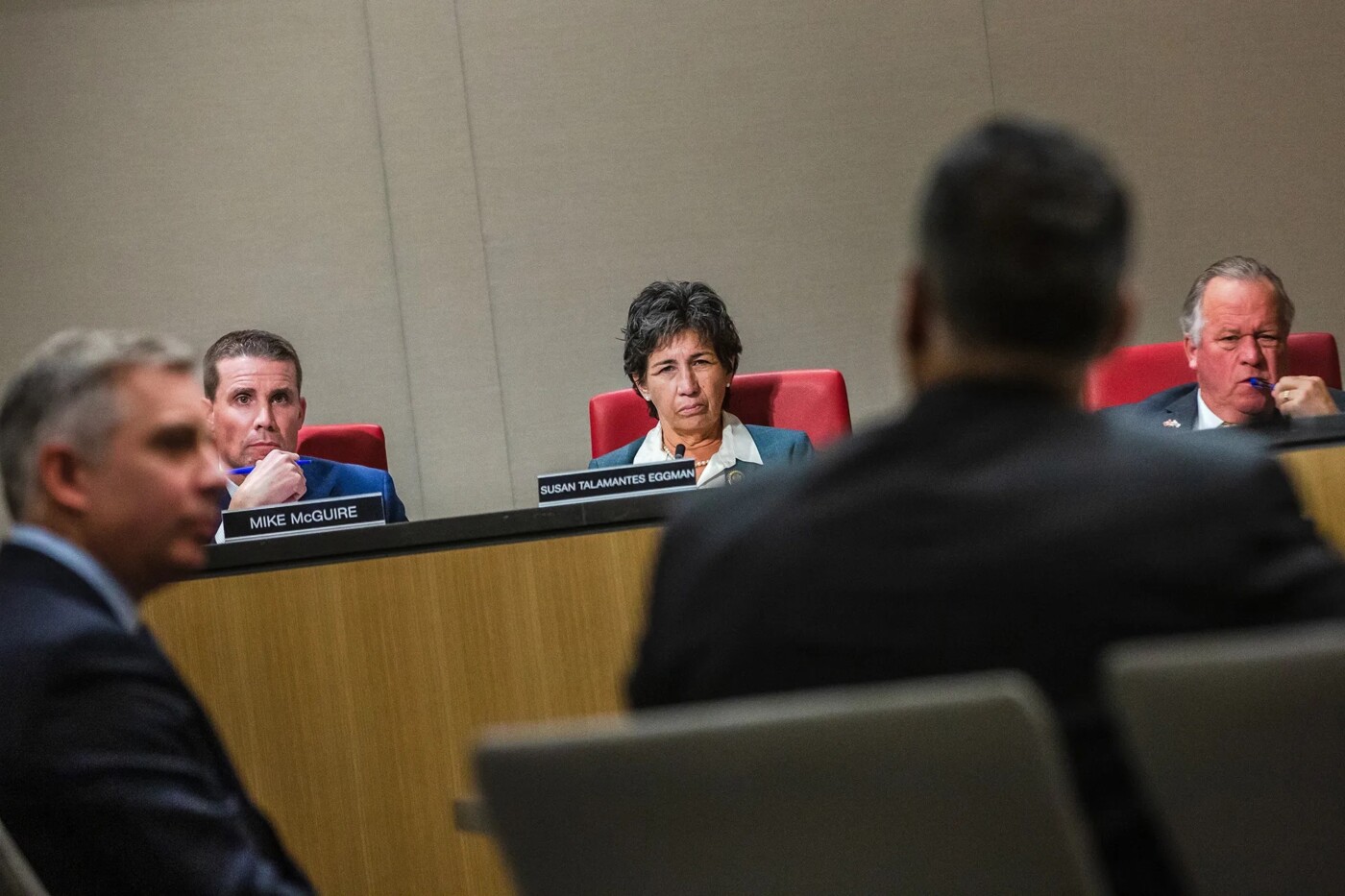Sacramento and Palo Alto offered up a tale of two California energy policies Wednesday as legislators considered the best way to stick it to Big Oil and Gov. Gavin Newsom talked up Tesla’s expansion plans.
The two events reflected two contrasting — arguably, contradictory — policy imperatives that the state faces:
- California plans to phase out the sale of gas-powered cars by 2035 as part of its clean energy transition.
- At the same time, sticker shock at the pump, one of the factors likely to speed up the state’s embrace of EVs, remains politically explosive.
That was highlighted at the state Capitol, where lawmakers convened the first hearing of a special legislative session to consider the governor’s proposal to tax the profits of California oil companies.
The idea got an uneven reception.
Nearly all the senators on the Energy, Utilities and Communications committee expressed outrage at the gas price spike that state’s drivers endured last fall and welcomed the opportunity to gather more information about California’s oil and gas markets.
But many committee members, including Democrats, seemed skeptical that imposing a financial penalty on oil refiner profits would have the desired effect.
- Steven Bradford, the committee chairperson and San Pedro Democrat: “What are we trying to solve for?…We have passed legislation here in California that has encouraged leaving oil in the ground…Have we created a scenario that has helped create this problem?”
- Napa Democratic Sen. Bill Dodd: “As outraged as we are (about high prices)…what the hell are the unintended consequences?”
Experts invited to give testimony were, on the whole, no more encouraging. They argued that focusing on the gas retail sector rather than on refineries could be the better course of action and that the Legislature should be clear about what problem it is trying to solve: price spikes, persistently higher prices or “excess” profits.
- UC Berkeley economist Severin Borenstein: “Policies intended to affect refineries are not going to get at most of the reason that Californians are paying higher prices for gasoline…Shooting first and then finding out if it’s the right solution is going is likely to be just as detrimental as helpful.”
Even before the hearing began, some environmental advocates began grumbling that Newsom’s proposal was unlikely to get a fair hearing. More than 100 advocacy groups sent a letter supporting what they call a “price gouging penalty.”
- The letter: “The oil industry is spending their record profits to undermine our democracy with disinformation, delay action on climate change, and overturn vital protections for communities living next to toxic oil drilling sites.”
Some of the skepticism from committee members came from the fact that, as Newsom noted last week, the proposal is novel. Though governments across Europe have imposed “windfall taxes” on oil drillers, this levy is directed specifically at refiners.
- Nicolas Maduros, director of the California Department of Tax and Fee Administration: “We’re facing a unique situation in California and it’s a relatively unique proposal.”
But California Energy Commissioner Siva Gunda, also speaking on behalf of the administration, argued that no matter the ultimate shape of the proposal (the specific numbers are still missing from a bill introduced Dec. 5), legislators would be wise to dedicate more resources to understanding the gasoline market, not despite California’s planned transition away from gas-powered cars, but because of it.
- Gunda: “The price spike events themselves need to be understood…because the transition away from gasoline-based transportation is going to further disrupt the market that we have been dependent on for 150 years.”
Earlier Wednesday, Newsom appeared with Musk — the proud owner of Tesla and the perhaps regretful owner of Twitter — to announce that the billionaire’s electric car company will be opening up a new engineering headquarters in Silicon Valley. In tech circles, the investment represents a symbolic changing of the guard: the new site used to be occupied by the once-dominant computer maker Hewlett-Packard.
For Tesla, the announcement was a two-part reconciliation:
- Tesla moved its corporate HQ to Texas in 2021 in a not so subtle critique of California’s business environment, its tax policy, its pandemic policies and its critical lawmakers.
- Though Newsom heaped praised upon Musk in the early months of the pandemic, more recently they’ve been at odds over matters of both business and politics.
All apparently water under the bridge now. In fact, Newsom, who is constantly fending off claims from the right that the state’s Democratic policies are anathema to industry, Tesla’s return was cause for some gleeful crowing.
- Newsom: “Let’s see this as the beginning of something even more extraordinary on the journey to dominate in this space and to change the way we produce and consume energy in this state and this nation and the world we’re trying to build.”
